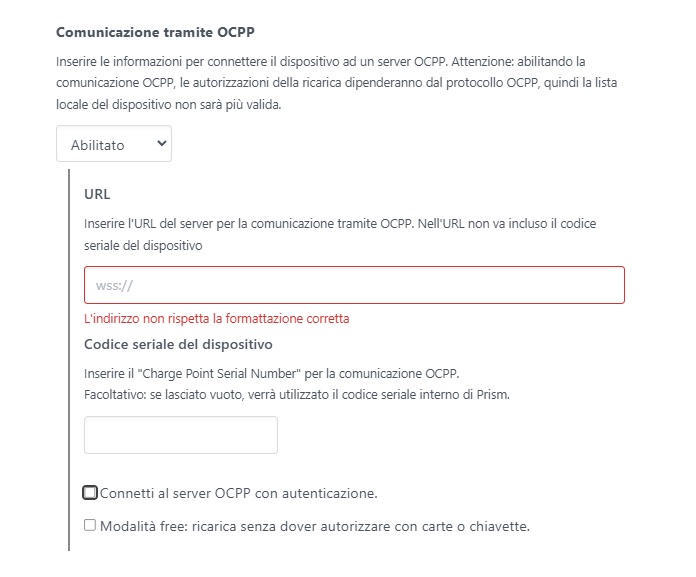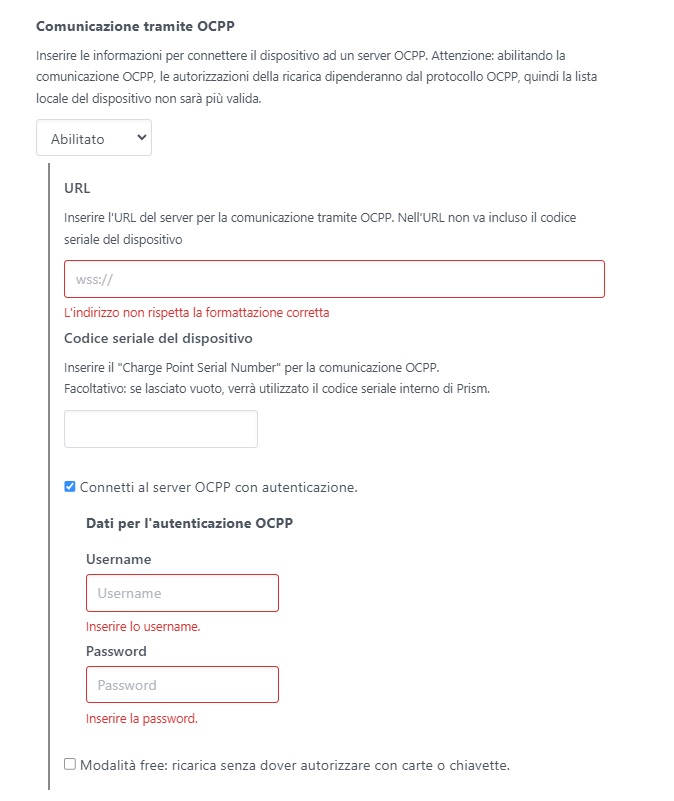Introduction
OCPP (Open Charge Point Protocol) is a communication protocol that enables communication between charging systems such as Prism Solar and a charging point management server, called Central System.
Through OCPP, the Central System can control and manage the various recharge points for operations such as recharge reporting, authorization through RFID cards, and management of recharge rates. OCPP is therefore suitable for all those scenarios where it is necessary to manage multiple recharge points, also installed in different locations and geographic areas, and to account for recharges.
OCPP is also critical in all contexts in which CPOs (Charge Point Operators) and eMSPs (e-Mobility Service Providers) that provide charge point management services via the OCPP protocol operate.
Configuration
OCPP configuration requires only the configuration of the parameters of the Central System you wish to connect to.
- Connect to Prism’s WiFi network and visit http://192.168.8.1/benvenuto:

- Enter the “installer” login credentials and scroll down the Guided Configuration page to the Communication via OCPP section:

- Press on the drop-down menu and select “Enable” to enable the compilation of the parameters to be configured:

- Configure OCPP parameters:
- URL: OCPP Central System URL.
- Device serial code: also called Charge Point Serial Number, a serial code that identifies the Prism.
- Authentication: in case the Central System requires authorization, check the corresponding value and enter user and password provided by the manager.

- Press “Next.”
Specifications
The following are the technical characteristics of OCPP for Prism Solar and Solar S.
Features – Feature Profiles
The feature profiles supported by Prism Solar and Prism Solar S are:
- Core.
- Basic functionality for starting, authorization, configuration, transaction and remote control of EVSE.
- Firmware Management.
- File management and remote Firmware update.
- Local Auth List Management.
- Local authorization management for recharge-enabled users.
- Reservation.
- Support for reserving a charging connector.
- Remote Trigger.
- Support for triggering messages from EVSE to receive the latest information or to resend messages.
Configurations – Configuration Keys
| Configuration Key | Value |
| GetConfigurationMaxKeys | 10 |
| LocalAuthListMaxLenght | 10 |
| SendLocalListMaxLenght | 10 |
| WebSocketPingInterval | 60 |
Security – Security Profiles
Cipher suite:
- TLS_ECDHE_ECDSA_WITH_AES_128_GCM_SHA256 & TLS_ECDHE_ECDSA_WITH_AES_256_GCM_SHA384.
Security profile:
- Security Profile 1 – Unsecured Transport with Basic Authentication.
- Security profile 2 – TLS (1.2 or higher) with Basic Authentication.
